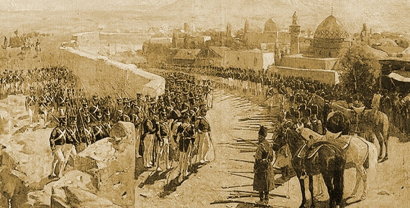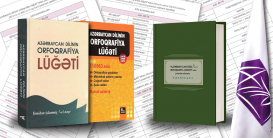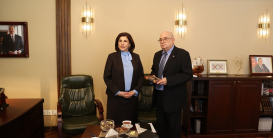Famous French Traveller’s Erivan Impressions

The Azerbaijan State Translation Centre (AzSTC) has produced Famous French Traveller’s Erivan Impressions, a documentary archival material, containing impressions of Azerbaijanis, their lives and traditions by famous French traveller Jean Chardin (born Jean-Baptiste Chardin, and also known as Sir John Chardin), who lived in the Erivan Khanate of Azerbaijan in the Middle Ages. The material is based on Chardin’s fine work The Travels of Sir John Chardin. AzSTC will distribute the video footage with subtitles in English, Russian, Turkish, Persian, Arabic, Georgian, French, Ukrainian, Spanish and German languages among accredited foreign embassies and consulates to the Republic of Azerbaijan, as well as the mass media and online social networks.
Jean-Baptiste Chardin
• Birth date: 1643, Paris;
• In 1666 by a special decree, the seventh Shah of the Safavid Dynasty Abbas II appointed Jean Chardin ‘his agent for the purchase of jewels’;
In 1685, he moved to England and lived there until the end of his life (1713);
• The second chapter of the collection The Travels of Sir John Chardin, housed in the Bibliothèque nationale de France (the national library of France, located in Paris), contains the author’s journey from Paris to Isfahan and is rich in notes about Azerbaijan.
Below are the traveler's impressions of the ancient Azerbaijani city of Erivan.
The Journey from Paris to Isfahan
“...We approached Irevan by sundown, leaving behind many cities and towns... The distance from Tbilisi to Irevan is 48 lieues[1]. Irevan is a big city, but without urban planning and dirty. The territory of the city mainly consists of orchards and vineyards. There is not a single beautiful building there. The city is located on a plain surrounded by mountains on all sides. The Zangi River[2] flows from the northwest, and the Kirkhbulag River[3] from the southwest. By the number of springs running into this river it received the name 'Kirkhbulaq River'.
...The Iravan Fortress is larger than a small town. The castle has an oval shape, the circumference of the circle is four thousand steps and consists of about eight hundred houses. Only purebred Safavids live there ... Two thousand soldiers were assigned to defend the fortress. The Irevan ruler’s palace is in the fortress... There is a small fortress on the hill on the north side of the fortress. The distance between them is almost a thousand steps. The defense of this small fortess is reinforced with double walls and cannons. Two hundred people can settle there. The name of this small fortress is Kechigala.
The city is located at a cannonball distance from the fortress ... There is also an old tower in the city. I could not find out when it was built ... Although there were inscriptions on the outside that looked like Armenian ones, the Armenians could never read them.
Next to the market, on the other hand, there is an old brick mosque, which now lies in ruins. The mosque is named the Div Sultan Mosque in honor of the person who built it. There is a large square three hundred steps away from it ... There are many baths and caravansaries in the city and in the fortress...
This beylerbeyi (we are talking about the Irevan ruler) is still called serdar. ... Serdar's name is Safigulu Khan.
The Irevan Beylerbeyi is the richest and most profitable province. His annual income is thirty-two thousand tomans (500,000 ecu4). Through banned ways, they bring this income up to two hundred thousand tomans a year.
J. B. Chardin’s first visit to Erivan coincided with the eve of Novruz, Azerbaijan's national holiday
“... It was March 21, 1673. Forty-seven minutes after sunrise, the garrison of the fortress and artillery declared New Year, and three volleys were fired to mark Novruz. Here the coming of the New Year is announced regardless of a night or day but by the moment when the Sun enters the sign of Aries.
There are too many religious and folk holidays in the Safavids. And the history of religious rites and major religious events, as well as the days that mark the change of seasons, are considered sacred and beloved. However, three religious holidays are solemnly celebrated and preserved as a tradition. The Safavids celebrate Ramadan the next day after it ends. The Feast of Sacrifice (Eid al-Adha,) and the date of Ali followers’ martyrdom on the religious path is sadly celebrated here. Despite the New Year festivity is not a national holiday, it is solemnly celebrated. It should be noted that the Novruz holiday lasts for three days. This holiday lasts until the eighth day in the palace, as well as in other places as soon as the Sun enters the sign of Aries. This holiday is called Novruz Sultaniye. It means 'Magnificent New Year' or 'New Year of the Empire'.
4 Ecu – French coin
On holidays, astrologers in festive come to the royal palace or to local rulers residences. To observe "equality between day and night" they usually come there an hour or two before that moment. Astrologers determine the equality of a day and night by making observations from low roofs and squares. At their signal, drum-fires are opened, musical instruments - drums, horns are sounded.”
[2] Another name of the Zengichay is “Childirchay”. Presently Armenian invaders name it as Razdan.
[3] Kirkhbulag, the former name was Gederchay. Presently Armenian invaders pronounce it as Getar.
AND OTHER...
-
 Movlud Movlud’s Short Story on Turkish Portals
Movlud Movlud’s Short Story on Turkish Portals
“Detayhaberler.com”, “Dibace.net” and “Haber.232.com”, leading Turkish portals, have posted in Turkish the short story “We Have Already Grown Up” by the...
-
 The Book “The Classification of Words Extracted from “The Spelling Dictionary of the Azerbaijani Language” Out
The Book “The Classification of Words Extracted from “The Spelling Dictionary of the Azerbaijani Language” Out
The Azerbaijan State Translation Centre has published a voluminous book “The Classification of Words Extracted from “The Spelling Dictionary of the Azerbaijani Language”
-
 Ambassador Carlos Enrique Valdes de la Concepcion: A New Stage in Azerbaijani-Cuban Literary Relations Begins
Ambassador Carlos Enrique Valdes de la Concepcion: A New Stage in Azerbaijani-Cuban Literary Relations Begins
On April 03, 2024, the Ambassador Extraordinary and Plenipotentiary of the Republic of Cuba to Azerbaijan, Carlos Enrique Valdes de la Concepcion, visited the State Translation Centre.









